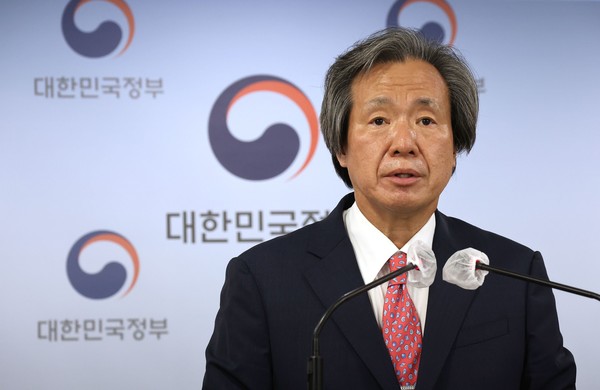Korea's top quarantine advisor said it was time to convert the Covid-19 emergency response system into a daily response one.

“We need to start discussing the transition from the current Covid-19 emergency response system to the daily Covid-19 response system,” said Jung Ki-suck, head of the National Advisory Committee on Infectious Disease Crisis Response, during a press briefing on Friday. “There are growing expectations worldwide that the Covid-19 pandemic will end soon.”
Korea also needs to prepare in advance for a complete return to daily life, Jung added.
Jung stressed that it is important for Korea to keep up with the transition as Korea is a country where trade is essential.
“In the next six months or so, the global community will start moving toward transitioning into a daily Covid-19 system, and global trade will begin to normalize,” Jung said. “Together with experts on various advisory committees, we will discuss and gather opinions while reviewing the quarantine situation.”
Jung noted that other countries have already taken measures to convert into a daily Covid-19 system.
“The U.S., the U.K., Germany, France, Israel, and Singapore have lifted their indoor mask obligations except for some facilities,” Jung said. “Even after lifting quarantine measures, the number of confirmed cases in the U.K. and France remains stable.”
Jung also predicted that it wouldn’t take long before the public viewed the Covid-19 virus in the same line as the influenza virus.
“Since Korea has vaccines and antiviral treatments, and has abundant hospital beds and an excellent outpatient treatment system, we are confident that Covid-19 will be manageable just like the flu,” Jung said. “The recent decrease in the aggravation and fatality rate is another reason for suggesting a system change.”
The fatality rate of Covid-19 in Korea has recently fallen to 0.04 percent, which is far lower than the initial 2.1 percent fatality rate reported during the initial Covid-19 epidemic, Jung added.
However, Jung ordered the health authorities and local governments to firmly prepare for the possibility of a twindemic -- the dual threat of a severe flu outbreak on top of the Covid-19 pandemic.
According to the KDCA, 5.1 among 1,000 patients who visited the hospital from Sept. 4-10 showed influenza-like symptoms. The figure is the highest for the same seven-day period in the last five years.
The government urged high-risk groups to promptly receive influenza shots once inoculations start next Wednesday, while requesting the public pay attention to personal hygiene to reduce transmission of the flu virus.
On Friday, Korea added 51,874 Covid-19 infections, including 348 cases from overseas, bringing the total caseload to 24,316,302, the Korea Disease Control and Prevention Agency said.
The nation also reported 60 more Covid-19 deaths, raising the death toll to 27,725. The fatality rate stood at 0.11 percent. The number of critically ill patients came to 516, up 25 from the previous day, the KDCA said.
According to the KDCA, about 44.67 million among 52 million Koreans have been fully vaccinated. In addition, about 33.57 million people had received their first booster shots, and 7.33 million had their second booster shots.

